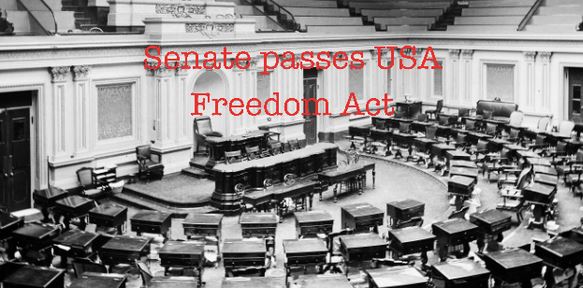USA Freedom Act re-defines privacy argument

On Tuesday, June 2, the United States Senate passed the USA Freedom Act with a majority of 67 to 32, after Section 215 and Section 206 of the USA Patriot Act expired on May 31st.
According to Mark Jaycox on eff.org, The USA Freedom act ends “bulk collection of phone records under Section 215” and “makes significant improvements to the FISA Court.”
The ancient debate over security vs. freedom is erupting throughout the nation. “I think it’s a very tough tightrope. I like the idea that says the phone company would hold onto the data and the government would have to have a warrant process, but I really dislike the collection of big data by google and facebook. I think security is extremely important,” Trevor Penwell ’15 said. “I think Americans already distrust the government to do the right thing, while at the same time relying on the government for security.”
In contrast with the USA Patriot Act that was implemented post 9/11, the United States government will no longer be able to collect citizen phone records in bulk and will have to gain warrants and go through the phone companies first. As stated by NPR.org, “Tuesday’s vote on the Freedom Act comes less than a month after a federal appeals court ruled that the National Security Agency’s practice of collecting bulk data about Americans’ phone calls violates the Constitution.”
Since the USA Patriot Act was passed on October 26th, 2001, the National Security Agency has had the power to, according to the ACLU, go through citizen’s financial records, medical histories, Internet usage, bookstore purchases, library usage and travel patterns. The government became involved in personal data collection because of American fear of potential terrorist threats after the September 11, 2001 attacks.
The new USA Freedom Act will add provisions to the USA Patriot Act by limiting government surveillance opportunities. According to Timothy Lee from Vox.com, “The USA Freedom Act creates a new, streamlined process for getting access to Americans’ phone records, but it requires these requests to be focused on a specific ‘selector,’ such as a customer name or phone number. It explicitly prohibits the bulk collection of customer data.”
In simpler terms, requests to collect data on citizen phone records need to be warranted and need to have a specific goal, such as gaining a phone number or name. No bulk data is collected.
The USA Freedom Act will also make the NSA accountable for its actions. New positions for court-appointed public employees are being hired to watch over surveillance activities and FISC proceedings.
Since the original USA Patriot Act allowed government access to library book records, several librarians see the new confidentiality of book records in the USA Freedom Act for librarians to see a much greater step towards library privacy.
“I am encouraged that executive director of the American Library Association called it ‘a milestone’ toward reinstating our privacy. It is such a dangerous thing for the government to have access to our library and phone records. I’m very happy we’re closer to finding a sane balance between security and privacy,” Staples High School Librarian Colin Neenan said.
According to social studies teacher Daniel Heaphy, “The debate over the balance of freedom vs. safety is just beginning.”

This active, opinionated, and nature-loving foodie has joined the Inklings Staff once again. Kit Epstein ’17, is a major contributor to the Inklings...
















































